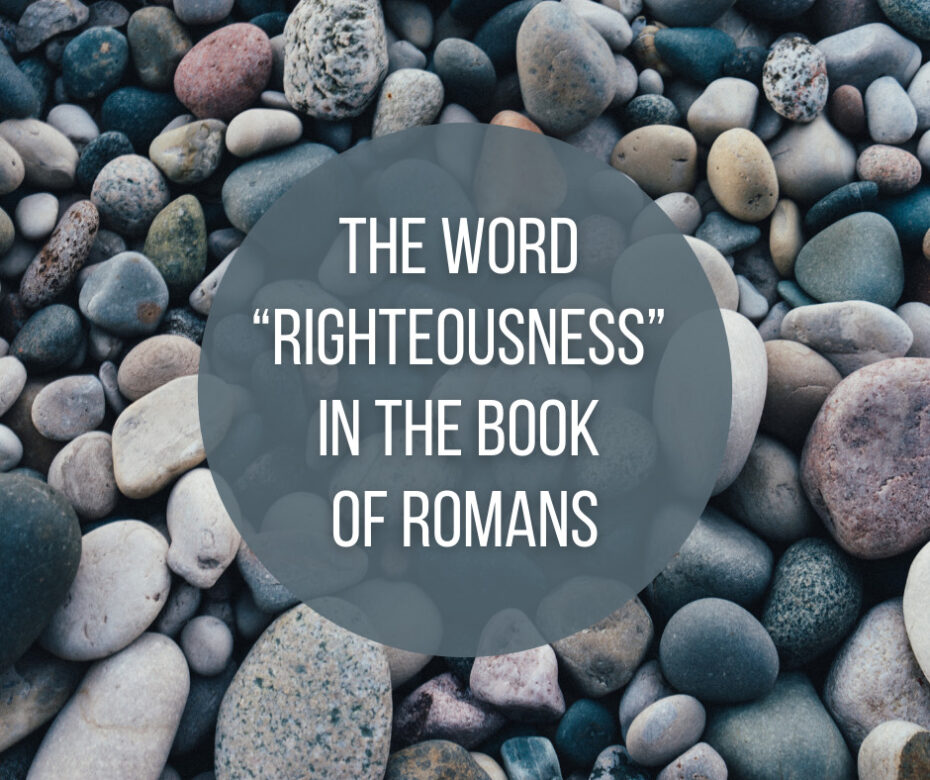One of the most interesting things about studying the book of Romans is how Paul uses the word “righteousness.” It is used over 35 times in the book. And that is counting just the noun, not the verb. Sometimes the word is translated “righteousness,” and other times it is translated “justification.” Most famously, it is used to describe what the person who believes in Jesus Christ for eternal life receives. We are declared righteous (or we might say we are justified) by God by faith (Rom 3:21-22; 4:3).
But many are not aware that Paul uses a couple of other different words that are translated in the same way. I would like to look at one of them. The word is a rare word. It only occurs twice in the NT. Both times it is found in the book of Romans. Specifically, it is found in Rom 4:25 and 5:18.
In Rom 4:25 both the NASB and the NKJV say that Jesus was raised for our “justification.” In 5:18, the NKJV says, “even so through one Man’s righteous act the free gift came to all men, resulting in ‘justification’ of life.” In this verse, the English once again translates this rare word by the word justification. The NASB does as well.
This raises some questions. Why did Paul use a different word if he meant the same thing (righteousness/justification)? Should we think that this rare word has another meaning? If so, what does the word mean?
In Rom 4:25 we most clearly see that Paul meant something else with this different word. Paul says that Jesus was “raised for our ‘justification.’” Most Evangelicals think Paul is saying that Jesus rose from the dead for our righteousness or justification in the sense that His resurrection proved that His death paid for all our sins.
Such an interpretation means that the rare word used here means the same thing as Paul’s usual word for righteousness/justification. When we believed in Jesus for eternal life, we were declared “righteous,” and Christ’s resurrection proves that we are declared “righteous” (or, we were justified).
But can I suggest another way of looking at this rare word? Paul uses a different word because he means something different. When Christ rose from the dead, that showed that He was alive. Because He is alive and the Holy Spirit lives within us, we can live righteously. Christ was raised for our “righteous living.”
This fits the context of Romans 5 perfectly. Romans 5–8 speak about walking by the Spirit and how to live righteously. Since Christ is not in the grave, not only are we declared righteous, but we can live like it. Paul’s normal word for “righteousness” is the result of Christ’s death. The rare word He uses for “righteousness” in 4:25 is the result of His life. When Paul uses a word for how the Christian should live, he uses a different word.
The other time Paul uses this rare word bears this out. In Rom 5:18 Paul says that the obedience of Christ to the Father (by dying on the cross) resulted in “justification of life.” Christ’s death made this possible. When the believer lives by the Spirit, he experiences life. He enjoys, grows, and reaps the life Christ has given him, the very life of God. He is living righteously.
When we look at the book of Romans and see the Greek words for righteousness/justification, we need to understand that Paul is telling us two different things, and thus uses two different words. Because of Christ’s death, when we believe in Jesus Christ for eternal life, we are declared righteous (experience justification). But because He also rose from the dead, His death and resurrection give us the opportunity to live righteously or to experience a justification on a daily basis that is produced by the very life of God we possess.


